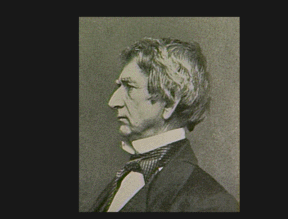![]()

Born in New York State in 1801, Seward attended local schools before entering Union College at the age of fifteen. After graduating from Union in 1820, he read law and was admitted to the bar. In 1823, he established himself in Auburn, New York. Auburn would remain his home for the rest of his life.
Intellectually adventurous, cheerful, and convivial-- though somewhat vain-- Seward naturally gravitated into politics. In the unsettled political conditions of the 1820s and early 1830s, he identified with the anti-Jacksonians. He supported John Quincy Adams, the Anti-Masonic Party, and, by 1834, the Whig Party. He served as state senator and, in 1838, won his first term as governor. He was reelected in 1840. During this time, he formed a close friendship and alliance with the editor, Thurlow Weed. As a politician, Seward supported Whig economic programs, particularly internal improvements. However, he stirred controversy and antagonized some anti-foreign and anti-Catholic elements of the Whig Party when he supported the demands of Catholics to have their children taught in public schools by teachers speaking the same language and sharing the same faith. His humanitarianism was also evident in his increasing interest in antislavery.
An election defeat in 1842 returned Seward to private law practice for seven years before he reentered politics with his election to the United States Senate. His victory owed much to the antislavery sentiment that infected both northern Whigs and Democrats during the Mexican War. During the famous session of Congress that resulted in the Compromise of 1850, Seward stood firmly against the Compromise and in favor of the unconditional admission of California as a free state. The manner in which he expressed his opposition to slavery-- referring to a "higher law than the Constitution"-- earned him an undeserved reputation for radicalism and helped undermine his presidential prospects.
During the 1850s, as the slavery issue intensified, Seward initially tried to keep the Whig Party alive, but by the end of 1855, he joined the newly organized Republican Party. Although occasionally delivering blistering attacks on slavery and predicting an irrepressible conflict between slavery and freedom, Seward increasingly moderated his stand, perhaps in hopes of landing the Republican presidential nomination in 1860. His shifting position forecast his zealous commitment to noncoercion during the Sumter crisis, as he sought to avert war and shore up Union sentiment throughout the South.
Failing to get the Republican nomination at Chicago in 1860, Seward campaigned extensively in the North for Lincoln. His prominence in the party led Lincoln to offer Seward the chief position in the cabinet, secretary of state. After some hesitation due to the composition of the cabinet, Seward accepted. In the early days of the administration, he thought his political experience and skills would enable him to dominate the President and the administration. Just as he too optimistically overestimated southern unionism, he had yet to take the full measure of Lincoln's abilities.